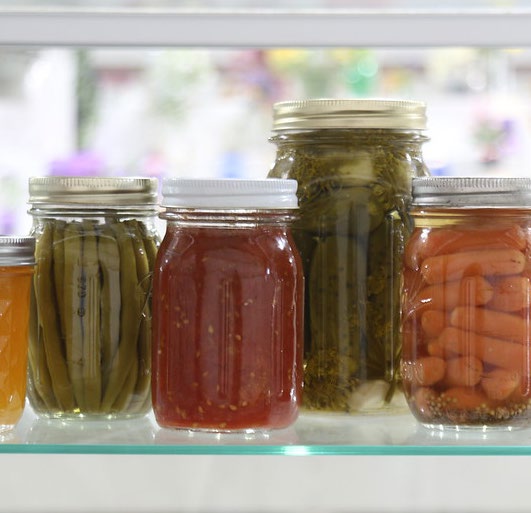
Educating Michigan About Safe Food Practices
DOWNLOADJune 7, 2022 - Becky McKendry, Michigan State University Extension
Impacts
Safe and properly prepared food can prevent foodborne illness, thus reducing healthcare costs and improving overall health and well-being. Whether for food entrepreneurs, volunteers preparing food for the community, childcare providers or consumers interested in preserving food, MSU Extension teaches a variety of classes to help everyone enjoy safe, healthy food. As a result of participating in an MSU Extension food safety or food preservation program:
- 84% of childcare providers who attended Safe Food = Healthy kids gained knowledge in controlling cooking time and temperature of food, one of the top control factors for keeping food safe.
- 98% of people who attended Michigan’s Cottage Food Law class better understand what they need to run a safe, successful cottage food business.
- 240% growth in attendance at the Investigating Food With Science program during 2021.
Priority Areas
- Encouraging safe food practices.
- Reducing the risk of foodborne illness.
- Teaching vendors, handlers and consumers about food safety.
- Educating consumers on safe, research-based home food preservation methods.
- Creating safer practices at food pantries with proper storage methods for bulk food distribution.
"This program gave me knowledge to help decide if I wanted to pursue opening my own business." Cottage Food Law class participant
To support MSU Extension’s food safety and preservation programming or to bring this programming to your community, contact Cheryl Eschbach (cheryl@msu.edu).

"Thinking Food Safety" to Increase Awareness of Illegal & Online Food Sales
The creative, educational content of the “Think Food Safety” campaign has now been educating consumers and cottage food entrepreneurs for two years. The campaign uses creative, educational content to highlight safe food practices on social media, as well as educational brochures, promotional postcards, a video, a table runner and a stake sign to be used in settings such as farmers markets. The program is funded in part by a grant from the Michigan Department of Agriculture and Rural Development (MDARD).
In 2021, MSU Extension food safety educators surveyed Michigan farmers market “market masters” to gain insight into what their vendors and consumers need to know about the Michigan Cottage Food Law. Seventy-six market masters, representing both rural and urban areas of Michigan, responded.
Their responses suggest that their biggest concerns are confusion about the law and the lack of resources by vendors and consumers. To respond to this need, the Think Food Safety team developed educational brochures and supporting information to connect people to MSU Extension as a trusted resource.
Survey results also showed the importance of increased Cottage Food Law awareness through our Think Food Safety Facebook page and website. The Think Food Safety Facebook page has grown in 2021, with a total reach of 321,237 and 2,282 followers.
In 2021, the team also produced a Think Food Safety podcast. Episodes on the Michigan Cottage Food Law and food licensing are available on MSU Extension's Safe Food and Water website.(canr.msu.edu/safe_food_water).
- 391 programs delivered by the food safety team in 2021.
- 7437 individuals reached by food safety team programming in 2021.
Encouraging the Entrepreneurial Spirit with Michigan Cottage Food Law
Starting your own food business can be tough. That’s why MSU Extension’s Cottage Food Law training provides valuable food safety information to Michigan entrepreneurs. The programming is made possible through a partnership with the MSU Product Center and Michigan Department of Agriculture and Rural Development (MDARD).
In 2021, MSU Extension educators help 29 Cottage Food Law classes and also offered a self-paced online course. The two training formats reached a total of 956 entrepreneurs in 2021. The volume of participant questions during the early classes led educators to add a Q&A panel featuring a MDARD inspector, food safety educators and a product center business counselor.
The training has led not only to the safe, successful launches of food businesses in the state, but also to changes in Michigan’s Cottage Food Law. For example, the original law only allowed cottage food vendors to accept payments in person. MSU Extension educators shared participants’ concerns about this limitation with MDARD staff, who lobbied for changes to allow cottage food vendors to accept payment online or by phone. The change helped Michigan cottage food vendors better meet their customers’ needs and grow their businesses.
More home-based businesses are being created every day, and the MSU Extension food safety team is there to help entrepreneurs get off on the right foot by understanding and following safe food handling, preparation, and storage practices.
"This program [Safe Food = Healthy Kids] was so helpful for me because the information that I received can not only help me at work, but also help me at home and in my future!" -Safe Food = Healthy Kids program participant

Engaging 8- to 12-Year-Olds Through Investigating Food With Science
Investigating Food With Science is an online program designed to help 8- to 12-year-olds explore the chemistry, nutrition and microbiology behind food. Through this program, children learn:
- To avoid cross-contamination by keeping fruits and vegetables separate from raw meat and eggs.
- To wash their hands and cutting boards in between handling different foods.
- The differences in storing and handling perishable and nonperishable foods.
- To use a food thermometer to ensure foods are cooked to safe temperatures.
Investigating Food With Science engages youth in food science and food safety-related topics using kid-friendly experiments and recipes.
MSU Extension developed Investigating Food With Science as a fun, online after-school activity to engage young people in food preparation, food safety and hands-on science experiments. Getting kids involved in cooking and proper food safety methods can help boost their confidence and lead them to develop healthy habits they’ll keep throughout their lives. During the program, food safety educators answer young people’s questions. Engaging animated videos are used to present each concept.
Investigating Food With Science has reached participants from 42 Michigan counties, 12 states and eight countries. In 2021, the program reached 742 participants and had over 100 views on the Think Food Safety page on Facebook.
Answers Provided on MSU Extension's Food Safety Hotline
MSU Extension’s food safety team provides much-needed food safety information to consumers through its Food Safety Hotline (1-877-643-9882). Food safety educators throughout Michigan answer hotline calls with research-based answers to food safety questions. The hotline is made possible through a partnership with the Food Safety Division of the U.S. Department of Agriculture. In 2021, the hotline received more than 149 calls.
Whether the caller is trying to learn the best way to thaw a holiday bird or to figure out if the food in a dented can is still safe, each hotline call is documented to help maintain a consistent message of food safety. To help ensure they’re giving consumers reliable answers, MSU Extension staff use the latest information from the National Center for Home Food Preservation website (nchfp.uga.edu) and So Easy to Preserve, from University of Georgia Extension.




 Print
Print Email
Email





